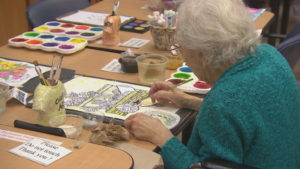 As a researcher, type in ‘daily activities in dementia’ into google scholar or other search engines, and you’ll probably get about 99% of studies describing how people with dementia are impaired doing everyday activities. Of course, dementia is characterised by deteriorating symptoms. These include cognitive problems, behavioural changes, sometimes mobility problems, and also difficulties with everyday activities.
As a researcher, type in ‘daily activities in dementia’ into google scholar or other search engines, and you’ll probably get about 99% of studies describing how people with dementia are impaired doing everyday activities. Of course, dementia is characterised by deteriorating symptoms. These include cognitive problems, behavioural changes, sometimes mobility problems, and also difficulties with everyday activities.
When we talk about daily activities, we distinguish between more complex activities, such as managing medication or finances [1], and more basic activities, such as getting out of bed or eating. Now, we know that being able to engage in these daily activities deteriorates throughout the dementia continuum [2]. And it is important to know this, so that people with dementia and their families can prepare in due time if possible.
But too often, especially in the more advanced stages of dementia, people with dementia get many activities done for them [3]. Sometimes even when the person might still be able to do those tasks. Why? If we take a little look into care homes for example, care staff is often so busy with all residents that they might not have a lot of time to care for each individual resident. Often, residents are very passive in care homes, and sit around for most of the time [4].
So care staff might just do a round of tea for a number of residents. Or they may just prepare some sandwiches for breakfast for the whole floor, saving time. But if the person with dementia is still able to do those tasks (and yes, often they are!) then residents simply do less and less. I suppose it’s like with astronauts in space, when you don’t use your muscles for a long time, then they’ll just go and fade away. Same with an individual living with dementia. If they don’t get up and make a cup of tea or a snack, or engage in social activities, and thus be physically active, get out of their seat, and engage their brain, then the abilities they have might just fade away quicker.
In a recent study, together with some great insights from researchers at Maastricht University (the Dutch don’t think they are at the forefront of dementia care, but they are!), we looked at some data into how people with dementia perform daily activities [5]. We looked at how hours of supervision provided by a family carer, and hours of actual daily activity care, were predictive of the ability to perform everyday activities.
What we found supports the narrative of people with dementia still being able to do daily activities. Interestingly, the study showed that supervising someone with dementia to engage in daily activities is linked to more independence. And not doing activities for them.
 Now, that shows that we need to do more to support people with dementia where they are still able to do activities. That’s why it is so important that we take a more deconstructive approach and not simply look at whether people are generally able or unable to do daily activities. We need to look at individual activities. What’s more, we need to break them down even further [6].
Now, that shows that we need to do more to support people with dementia where they are still able to do activities. That’s why it is so important that we take a more deconstructive approach and not simply look at whether people are generally able or unable to do daily activities. We need to look at individual activities. What’s more, we need to break them down even further [6].
So, someone might still remember most steps of making a hot drink, and wants to make one!, but might forget where the teabags are. So, family carers, paid carers, or care staff – anyone – can support the person to make a hot drink, and indicate where the teabags are.
Another example, someone might still really want to go to the shop and buy groceries for themselves. But, they might forget how to pay at the till. Best thing to do is support the person and go with them, and not do the shopping for them.
It’s all about what the person is still motivated to do, and making sure to support them with their activities. So hopefully, this will help people with dementia stay in their own home for longer. More independently. More active. More engaged.
(Ed: We published a podcast on risk enablement in healthcare / care home settings, tune in here [7])
Author
Dr Clarissa Giebel [8] is a Postdoctoral Research Associate at the University of Liverpool and NIHR CLAHRC North West Coast. She has been working in dementia care research for over 7 years focusing her research on on helping people with dementia live at home independently for longer.
You can follow Clarissa on Twitter Follow @ClarissaGiebel [9]